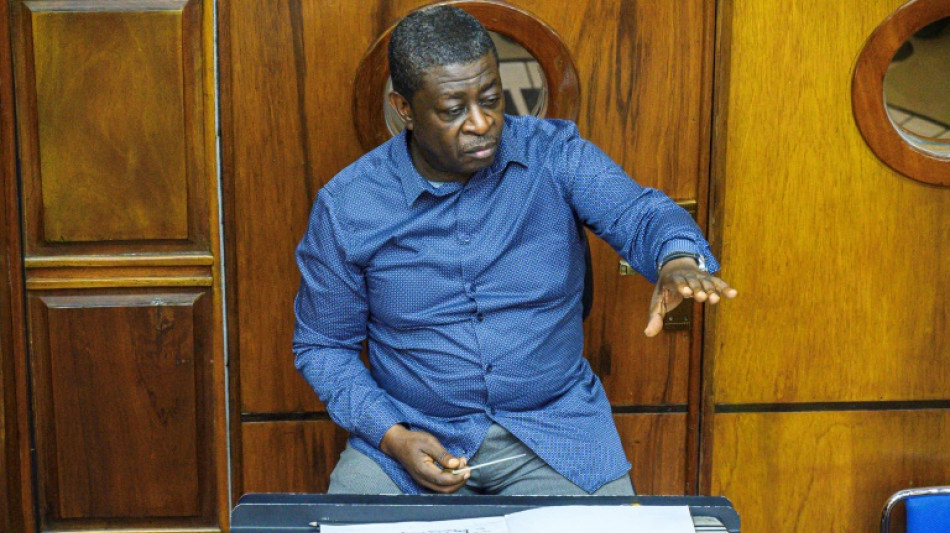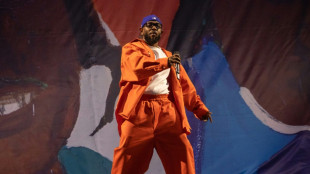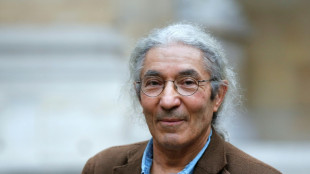
-
 Majestic Jaiswal 141 not out as India pile pain on Australia
Majestic Jaiswal 141 not out as India pile pain on Australia
-
Giannis, Lillard lead Bucks over Hornets as Spurs beat Warriors

-
 Juan Mata agent slammed as 'cowardly' by angry A-League coach
Juan Mata agent slammed as 'cowardly' by angry A-League coach
-
Marta inspires Orlando Pride to NWSL title

-
 Palestinian pottery sees revival in war-ravaged Gaza
Palestinian pottery sees revival in war-ravaged Gaza
-
Main points of the $300 billion climate deal

-
 Robertson wants policy change for overseas-based All Blacks
Robertson wants policy change for overseas-based All Blacks
-
Israel retreat helps rescuers heal from October 7 attack

-
 Afghan women turn to entrepreneurship under Taliban
Afghan women turn to entrepreneurship under Taliban
-
Mounting economic costs of India's killer smog

-
 At climate talks, painstaking diplomacy and then anger
At climate talks, painstaking diplomacy and then anger
-
Uruguayans head to polls with left hoping for comeback

-
 Trump's mass deportation plan could end up hurting economic growth
Trump's mass deportation plan could end up hurting economic growth
-
Iran director in exile says 'bittersweet' to rep Germany at Oscars

-
 US consumers to bargain hunt in annual 'Black Friday' spree
US consumers to bargain hunt in annual 'Black Friday' spree
-
Cheers, angst as US nuclear plant Three Mile Island to reopen

-
 Scientists seek miracle pill to stop methane cow burps
Scientists seek miracle pill to stop methane cow burps
-
Australia ditches plans to fine tech giants for misinformation

-
 Developing nations slam 'paltry' $300 bn climate deal
Developing nations slam 'paltry' $300 bn climate deal
-
Red Bulls win 'Hudson River derby' to reach conference final

-
 Neuville wins world title after Tanak crashes at Rally Japan
Neuville wins world title after Tanak crashes at Rally Japan
-
Neuville wins world rally title after Tanak crashes in Japan

-
 Colapinto cleared for Las Vegas GP despite heavy crash
Colapinto cleared for Las Vegas GP despite heavy crash
-
'Smiling One' Amorim vows he has ruthless streak Man Utd need

-
 Marseille down Lens to stay in touch with Ligue 1 leaders, Lyon draw
Marseille down Lens to stay in touch with Ligue 1 leaders, Lyon draw
-
New Zealand beat 'proud' Italy in Cane's Test farewell

-
 Barca collapse in Celta draw without Yamal, Simeone hits milestone
Barca collapse in Celta draw without Yamal, Simeone hits milestone
-
Thailand's Jeeno equals Yin for lead at LPGA Tour Championship

-
 New Zealand beat Italy in Cane's Test farewell
New Zealand beat Italy in Cane's Test farewell
-
Marseille down Lens to stay in touch with Ligue 1 leaders, Lyon held to draw

-
 Liga leaders Barca suffer late collapse in Celta draw
Liga leaders Barca suffer late collapse in Celta draw
-
Retegui fires Atalanta top of Serie A ahead of Inter

-
 Greaves hits maiden Test century as West Indies dominate Bangladesh
Greaves hits maiden Test century as West Indies dominate Bangladesh
-
Venezuela opposition calls for mass anti-Maduro protest on Dec. 1

-
 'Fragile' Man City in uncharted territory, admits Guardiola
'Fragile' Man City in uncharted territory, admits Guardiola
-
Erasmus hails Springbok strength in depth after thrashing Wales

-
 Postecoglou calls for consistent Spurs after Man City rout
Postecoglou calls for consistent Spurs after Man City rout
-
'We've never lived this situation' admits Guardiola

-
 Lebanon says more than 55 killed in Israeli strikes
Lebanon says more than 55 killed in Israeli strikes
-
'We've never lived this situation' admits Guardiola as Man City lose five in a row

-
 Under-fire Gatland 'motivated' to continue as Wales coach
Under-fire Gatland 'motivated' to continue as Wales coach
-
South Africa send Wales crashing to 87-year low in Test rout

-
 Spurs condemn Man City to fifth straight defeat as Arsenal win
Spurs condemn Man City to fifth straight defeat as Arsenal win
-
Defeated Leipzig lose more ground on Bayern, Frankfurt go second

-
 South Africa put Wales to the sword to wrap up season
South Africa put Wales to the sword to wrap up season
-
Spurs thrash Man City 4-0 to end 52-match unbeaten home run

-
 Defeated Leipzig lose more ground on Bayern
Defeated Leipzig lose more ground on Bayern
-
Venezuela opposition calls for 'enormous' anti-Maduro protest

-
 Inter take Serie A lead as AC Milan and Juve bore in stalemate
Inter take Serie A lead as AC Milan and Juve bore in stalemate
-
England captain George wary of Jones's influence on Japan


Top Africa orchestra began with brake cables for strings
When Armand Diangienda founded the Kimbanguist Symphony Orchestra -- one of the most famous in Africa -- in 1994, they had so few instruments that musicians had to share.
They got to play them for only 15 minutes before handing them on to the next person.
"When a string broke, we would replace it with bicycle (brake) cables," he told AFP.
With the Democratic Republic of Congo at war and in chaos for most of the orchestra's first decade, they had to mend and make do with the poor quality instruments they could find.
"We didn't know how to buy a violin, we didn't know how to buy a string," Diangienda said. "So when a violin broke we had to repair it."
But "we were motivated".
The orchestra, which began with a ragtag band of around a dozen string musicians, has since gone on to become a trailblazer for classical music in Africa, with fans all over the world.
"At the beginning it was really just a dream," Diangienda told AFP from a studio in its Kinshasa headquarters as musicians tuned up outside.
The orchestra now boasts 200 highly accomplished members, including a choir.
- 'Real learning curve' -
But at the beginning not everyone knew how to read music and the group had just a few instruments between them.
"It was a real learning curve," Diangienda said.
The instruments they had were in poor condition -- not helped by the hot and humid climate -- and there was little money.
But by 1999 everyone had their own instrument picked up here and there.
The idea for the orchestra was born in 1985 when Diangienda's father, Joseph, asked him to gather up different musical groups from within the Kimbanguist church.
The religious movement -- which is said to have millions of members in the DRC -- was founded in 1921 by Diangienda's grandfather, a visionary whose followers believe he was Jesus Christ's special envoy on Earth.
The orchestra gave its first concert almost exactly 30 years ago in December 1994.
Since its humble beginnings it has played in countries across the world including Germany and the United States and has met celebrities including Angelina Jolie and Lionel Richie.
It has also collaborated with other groups including Germany's Tuebingen Chamber Orchestra and regularly has international soloists play with it.
Its conservatory of music in Kinshasa is now home to a school for young people to learn to read and play music.
- Persistence pays -
But teaching musicians was not always so seamless, and many joined with absolutely no musical knowledge.
Pauleth Masamba, 43, joined up the year the orchestra was founded wanting to play the cello, but accidentally mixed up its name with the violin -- two very similar words in French.
But as the orchestra grew, so did her love for her instrument.
"I bring it everywhere, even if I go on a personal errand I go with my violin. It's my loyal friend," she said, holding the instrument as she talked.
Two years after the orchestra began, the DRC was plunged into the First Congo War, which saw dictator Mobutu Sese Seko ousted, and then the longer and even more bloody Second Congo War from 1998 to 2003.
But it has still managed to become one of the continent's leading classical music institutions.
Dauphine Mata, a 33-year-old violinist who joined at 19, hailed it for introducing classical music to the country and continent.
"Before (becoming famous) we had a small fan base, people weren't really interested in the music," she said.
"Now we are on the stage more people appreciate it," she added.
But no one is more proud of their work than Diangienda.
"We were patient and we persevered, we alway fought for our dreams," he said.
M.Odermatt--BTB



